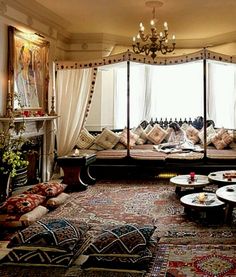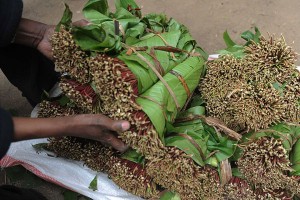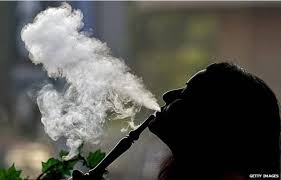By MaanHadal
In a small room filled with light, softsmoke blowing from a finely crafted incense burner, a group of men are chewing mouth-watering, bitter-tasting tender stems of Kenyan Miraa – cheerfully tucking handfuls of the stuff into their mouths – displaying swollen cheeks – and squinting with one eye.

The scene at the chewing session is reminiscent of the decadent wealthy Arabs lifestyle of sitting on floor cushions in secluded discussions surrounded by refreshments or beverages ranging from the sparkling ice-cold Sprite, Coca Cola, and the delightfully spiced Somali tea in black form or with splash of milk of the dromedary camel, or cow or goat milk. Other consumable products include peanuts, chewing gum, peeled garlic, painkillers, and benzodiazepines and other barbiturates to boost the chewer’s rhetoric and political medley, and elevate religious and philosophical thoughts.
To some consumers, Miraa is considered to be a nutritive arousing herb that is capable of easing aggravations and irrepressible factors facing the consumer – often prompted by the very plant that helps revitalize energy. The herb comes in various forms: there is the long type known as Kangeta-named after a small Miraa producing settlement in Meru County-a region in Kenya exclusive to the Ameru ethnic group that inhabit the eastern and northern slopes of Mount Kenya-the second tallest mountain in Africa after Mount Kilimanjaro in Tanzania. It is followed by the pricey and most decorated variety known as Kolombo; the Caleenle breed that is bushy and succulently moisturous; and the selectively leafy, low-grade category known as Makokha-a delight for the financially deprived.
Viewing from the outside, there is nothing particular with the group. Nothing special or unusual about them, you may think. They are normal mainstream folks like you and I, immersed in a worldly paradise of their making.
Though unbeknownst to them, these ‘normal happy souls’ are nursing a mild form of mental illness and depression – a resilient kind of bipolar manic that is unlikely to be detected through or diagnosed by medical examination but often healed and regulated by chewing Khat – in social gatherings known as therapy sessions – lavishly patronized by people from all walks of life enjoying themselves in private. “Mental illness”, “Schizophrenic”, “Bipolar” “mental or anxiety disorder” or “psychosis”–whatever the label – has never been a 100% thing. It varies in degrees and stages. You may have a mental illness of 5% or 95%. You may be borderline or at an advanced stage. Quite often, it is all about our personal assumptions and

subjective judgments of one’s behavior and personality. But in Somali circles, people casually described as “nin isku buuqsan ama buufis qaba” -if properly examined by a trained psychiatrist will readily diagnose them to be somewhat unhinged.
Khat provides a palliative care that helps reduce pain, hardship and trauma and improves cognitive functions – albeit temporary. It injects into the blood a relieving dose of antidepressant stimulus and a boost to blood flow; a momentary relief of stress; a soothing massage to the mind, and elevates the body to a higher level of euphoria and excitement. For centuries, Khat has been used as a remedy for fatigue, obesity, mental depression, social exclusion, and sexual enhancement – though lately, it is associated with a heightened sexual desire without commensurate performance.
Each of these therapy sessions, which are held regularly in different venues, are hosted by a professional therapist or a caretaker – well versed in the characteristics and vernacular of the herb – who is responsible for organizing the setting and the logistics requirement of the therapy saloons or the Mafrash –as it is known locally.
In the therapy sessions – which typically occur in the late afternoons or early evenings -the group are either animated and engaged or entirely withdrawn and in conversation with themselves. In the early hours of the therapy session, a welter of words take place – with all talking at the same time and none listening. This is the time that the group presents– in trying to tackle the big subjects of the day – excellent, incisive analysis, superb intellect and acumen, gushing forth with some of the most brilliant ideas ever conceived. Kinds of thoughts and ideas that never seem to tie in-vanish in the morning nonetheless! In the later part of the session, melancholy sets in. The lively discourse is supplanted by muted gestures – and active, vibrant conversations keep waning, gradually.
Members of the group are engaged professionals of all stripes: lawyers, doctors, and engineers, accountants, elected officials, diplomats, humanitarian workers, affluent entrepreneurs, enterprising arm-chair pundits, omnipresent Diasporas, local sages and politicians of all shades.They are neither out-patients – in the clinical sense of the word – nor under any form of medical treatment. None of them are fully cognizant of their mental illnesses, though.They are responsible husbands, caring fathers and respected members of their communities – respected in their respective professions as well. Yet, all are walking patients of a sort.

Some of the members of the group are first class connoisseurs of music and enjoy savoring classical Qaraami songs during therapy sessions. Others regale in smoking shisha or hookah for hours without a break – emitting sweet-smelling light smoke from their mouths. The Shisha – fondly dubbed Asha Qoor-dheer locally- with supremely crafted bottles and colored hose (pipes) oozes beautiful scent of double apple as the young men puff away to their heart’s delight. Rising to mainstream popularity of late, Shisha is the new custom. It has become paraphernalia of Khat industry; the young welcome it whilst the seasoned chewers flee at the sight of Asha Qoor-dheer. Flavors of Shisha types come in varying colors, shapes, and concoctions. There is the Fumari, Haze, Fantasia, Tangiers Birquq, Tangiers Noir, Al Fakher, Nirvana, Hookafina, Double Apple, Mint-gum and the list could be endless – the group’s favorite of late being Al-Fakher.
Those in their advanced stage of the bipolar, drive solace and mental relief in chanting the mystically invigorating Qadiriya hymn, which harmoniously infuses Arab-Islamic songs with the melodic rhythm of the most uplifting Xadro tune reminiscent of Xerta Ulamadoow.
There are those relegated to the recesses of the therapy saloons – devoured by mystical astrology and Sufism – pouring, intermittently, copious amount of Fur Cadde (Omaar’s Eau de Cologne) all over their heads and shoulders and reciting salawat repeatedly – gazing heavenwards in the hope of catching a glimpse of the tantalizing cosmic waves of the great Sufi saints. However, hypothetically, surreptitiously unbeknownst to you, among the chewers, are some who transcend into Apotheosis-a metamorphic process that transforms the user into god-like status. During this time, they develop a sui generis communication channel with their favorite saints of foretimes.
Indisputably, the uniquely honorific Khat that has been food for the saints (Quud Awliya) for Millenniums continues to provide incomparably advanced therapeutic mental health rejuvenation globally for millions of chewers who consume it responsibly, intermittently or on a daily basis. Those frequenting the therapy sessions are in their best healthy state of mind – happy and energized (and most courteous) – when munching the leaves ad stems of the Khat in the sessions – driving the greatest relieve from stress and frustration and achieving a sense of contentment. In the sessions, they shift from a lower state of mind to an elevated state of mind, generating positive feelings and improved effectiveness in mental health.
Time to revitalize your mind with a popular nontraditional psychotherapy that works for millions!
MaanHadal
We welcome the submission of all articles for possible publication on WardheerNews.com. WardheerNews will only consider articles sent exclusively. Please email your article today . Opinions expressed in this article are those of the author and do not necessarily reflect the views of WardheerNews.
WardheerNew’s tolerance platform is engaging with diversity of opinion, political ideology and self-expression. Tolerance is a necessary ingredient for creativity and civility.Tolerance fuels tenacity and audacity.
WardheerNews waxay tixgelin gaara siinaysaa maqaaladaha sida gaarka ah loogu soo diro ee aan lagu daabicin goobo kale. Maqaalkani wuxuu ka turjumayaa aragtida Qoraaga loomana fasiran karo tan WardheerNews.
Copyright © 2024 WardheerNews, All rights reserved


